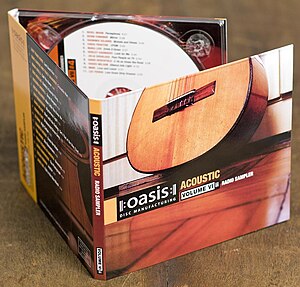Digipak
Some of this article's listed sources may not be reliable. (July 2009) (Learn how and when to remove this template message) |

A digipak is a style of optical disc packaging. A digipak case consists of a rectangle cardboard package with one or more plastic trays capable of holding a CD or DVD attached to the inside. Variations include where the discs sit on a hub or spindle inside. Among commercial audio CD releases, Digipak-style cases are one of the few common alternatives to the somewhat brittle jewel case.
Features[edit]
Digipak-style cases grew in popularity among record labels and recording artists in the early 2000s.
Since Digipaks were among the first alternatives to jewel cases to be used by major record companies, and because there is no other common name for Digipak-style packaging made by other companies, the term digipak or Digi-Pak[1] is often used generically, even when the media holder is a hub or "Soft Spot"[2] rather than a full plastic tray.
Digipak-style packaging is often used for CD singles or special editions of CD albums and the tall DVD Digipak (DVDigipak)[3] is used as a premium package for DVDs and DVD sets. Such packaging is less resistant to abrasion than jewel cases, so it tends to show signs of wear relatively quickly. Licensed digipak manufacturers such as domestic U.S. printer and disc replicator Oasis Disc Manufacturing[4] recommend coating the raw printed paper with a protective UV coating, thus ensuring greater longevity.
Although less vulnerable to cracking than a jewel case, the disc tray inside the package (particularly the "teeth" of the hub which secure the disc in place) remains rather brittle and is prone to cracking if the package is crushed. The disc tray can become detached if handled or stored improperly.

Manufacturers have sought to reduce environmental impact and improve functionality by introducing recycled components into its trays; one has announced a 100% post-consumer PET tray made from recycled bottles,[5] which also eliminates the need for the brittle "teeth".[6] Another one goes one step further by totally eliminating the plastic tray and replacing it with a paper tray made from sugarcane and egg carton. Many printers use recycled or sustainable material for the board stock.
History and intellectual property[edit]
The case is trademarked and patented.[7] IMPAC Group, Inc. originally owned the Digi-Pak trademark. That company was acquired by MeadWestvaco (MWV) in 2000 and folded into its AGI Media division. Following this acquisition, the Digipak name and designs were licensed to manufacturers around the world. MWV sold AGI Media to Atlas Holdings in 2010. In 2012, Atlas purchased Shorewood Packaging from International Paper and merged the two companies to create AGI-Shorewood.
See also[edit]
References[edit]
- ↑ "Walmart.com: Beyond The Pale (Digi-Pak), Jim Gaffigan: Special Interest". Walmart.com. Archived from the original on 2009-09-15. Retrieved 2011-11-11.
Beyond The Pale (Digi-Pak)
- ↑ "Soft-Spot CD Packages". Oasiscd.com. Retrieved 2011-11-11.
- ↑ "DVDigipaks". Oasiscd.com. Retrieved 2011-11-11.
- ↑ "Digipak® CD Packages". Oasiscd.com. Retrieved 2011-11-11.
- ↑ "Oasis BottleTray digipak postconsumer soda water bottle trays 100% post-consumer". Oasiscd.com. Retrieved 2011-11-11.
- ↑ "Plastic free digipak made from recycled egg carton and sugarcane". newcyberian.com. Retrieved 2012-01-03.
- ↑ U.S. Patent 4,709,812
External links[edit]
de:CD- und DVD-Verpackungen#Digipak
This article "Digipak" is from Wikipedia. The list of its authors can be seen in its historical and/or the page Edithistory:Digipak. Articles copied from Draft Namespace on Wikipedia could be seen on the Draft Namespace of Wikipedia and not main one.
